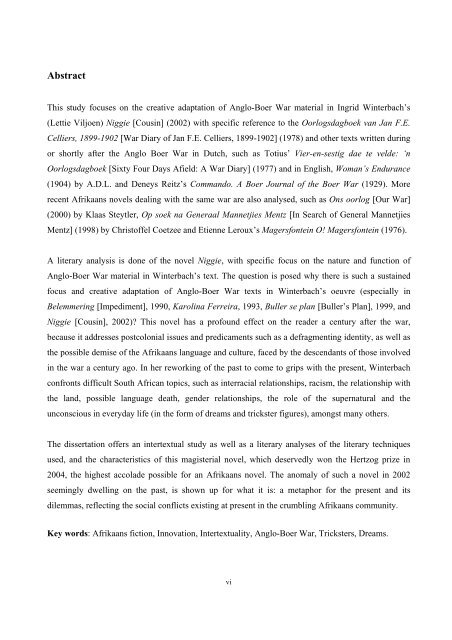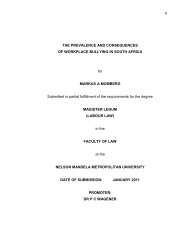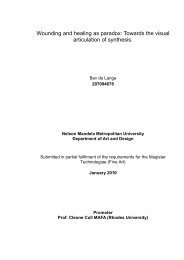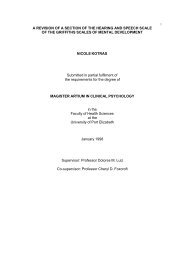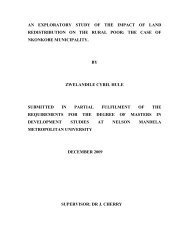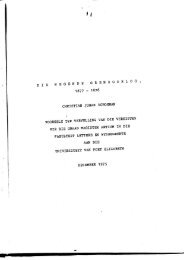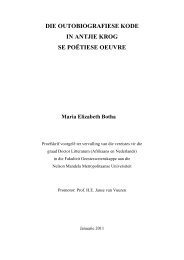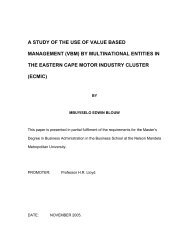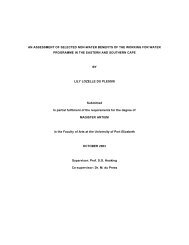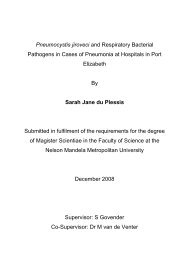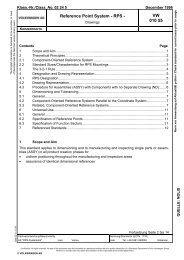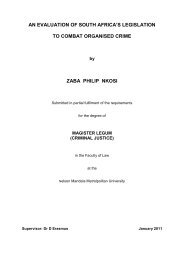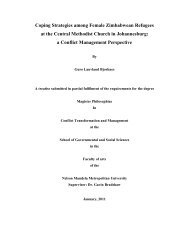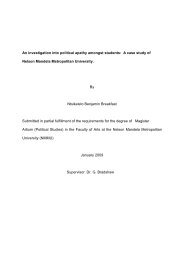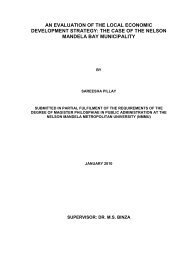Eksperiment en intertekstualiteit: - Nelson Mandela Metropolitan ...
Eksperiment en intertekstualiteit: - Nelson Mandela Metropolitan ...
Eksperiment en intertekstualiteit: - Nelson Mandela Metropolitan ...
You also want an ePaper? Increase the reach of your titles
YUMPU automatically turns print PDFs into web optimized ePapers that Google loves.
Abstract<br />
This study focuses on the creative adaptation of Anglo-Boer War material in Ingrid Winterbach’s<br />
(Lettie Viljo<strong>en</strong>) Niggie [Cousin] (2002) with specific refer<strong>en</strong>ce to the Oorlogsdagboek van Jan F.E.<br />
Celliers, 1899-1902 [War Diary of Jan F.E. Celliers, 1899-1902] (1978) and other texts writt<strong>en</strong> during<br />
or shortly after the Anglo Boer War in Dutch, such as Totius’ Vier-<strong>en</strong>-sestig dae te velde: ‘n<br />
Oorlogsdagboek [Sixty Four Days Afield: A War Diary] (1977) and in English, Woman’s Endurance<br />
(1904) by A.D.L. and D<strong>en</strong>eys Reitz’s Commando. A Boer Journal of the Boer War (1929). More<br />
rec<strong>en</strong>t Afrikaans novels dealing with the same war are also analysed, such as Ons oorlog [Our War]<br />
(2000) by Klaas Steytler, Op soek na G<strong>en</strong>eraal Mannetjies M<strong>en</strong>tz [In Search of G<strong>en</strong>eral Mannetjies<br />
M<strong>en</strong>tz] (1998) by Christoffel Coetzee and Eti<strong>en</strong>ne Leroux’s Magersfontein O! Magersfontein (1976).<br />
A literary analysis is done of the novel Niggie, with specific focus on the nature and function of<br />
Anglo-Boer War material in Winterbach’s text. The question is posed why there is such a sustained<br />
focus and creative adaptation of Anglo-Boer War texts in Winterbach’s oeuvre (especially in<br />
Belemmering [Impedim<strong>en</strong>t], 1990, Karolina Ferreira, 1993, Buller se plan [Buller’s Plan], 1999, and<br />
Niggie [Cousin], 2002)? This novel has a profound effect on the reader a c<strong>en</strong>tury after the war,<br />
because it addresses postcolonial issues and predicam<strong>en</strong>ts such as a defragm<strong>en</strong>ting id<strong>en</strong>tity, as well as<br />
the possible demise of the Afrikaans language and culture, faced by the desc<strong>en</strong>dants of those involved<br />
in the war a c<strong>en</strong>tury ago. In her reworking of the past to come to grips with the pres<strong>en</strong>t, Winterbach<br />
confronts difficult South African topics, such as interracial relationships, racism, the relationship with<br />
the land, possible language death, g<strong>en</strong>der relationships, the role of the supernatural and the<br />
unconscious in everyday life (in the form of dreams and trickster figures), amongst many others.<br />
The dissertation offers an intertextual study as well as a literary analyses of the literary techniques<br />
used, and the characteristics of this magisterial novel, which deservedly won the Hertzog prize in<br />
2004, the highest accolade possible for an Afrikaans novel. The anomaly of such a novel in 2002<br />
seemingly dwelling on the past, is shown up for what it is: a metaphor for the pres<strong>en</strong>t and its<br />
dilemmas, reflecting the social conflicts existing at pres<strong>en</strong>t in the crumbling Afrikaans community.<br />
Key words: Afrikaans fiction, Innovation, Intertextuality, Anglo-Boer War, Tricksters, Dreams.<br />
vi


